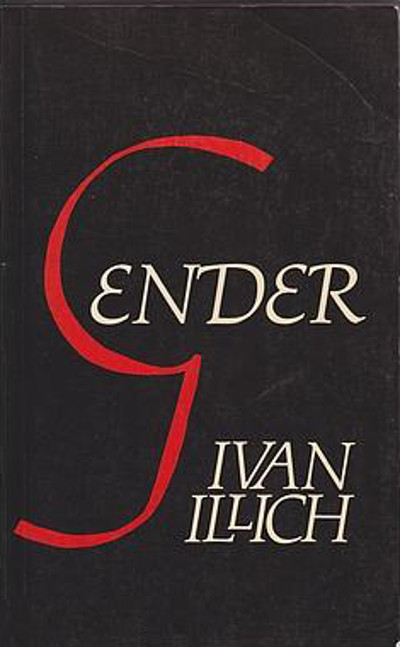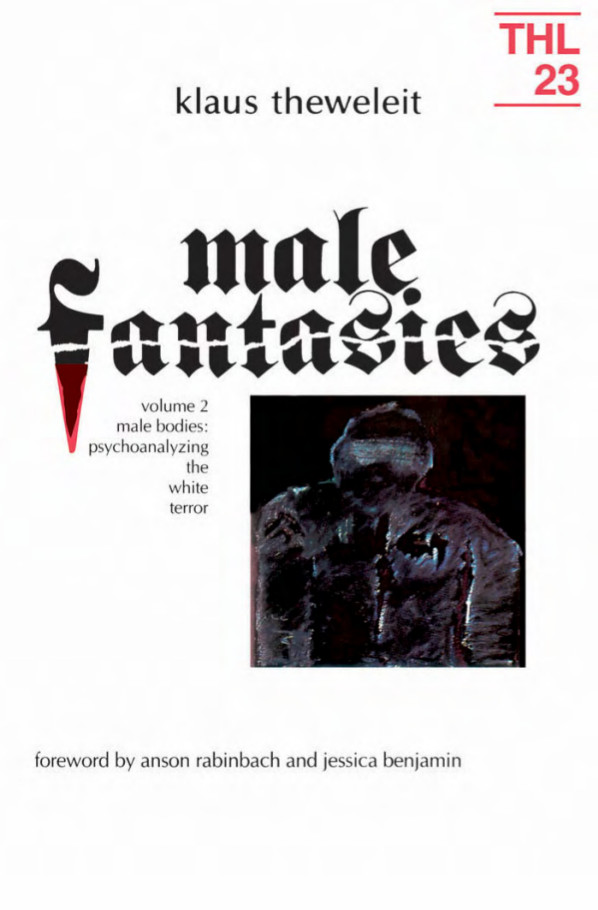Ivan Illich: Gender (1982)
Filed under book | Tags: · commons, economics, economy, gender, labour, marxism, medicine, men, production, rent, sex, sexuality, women, work

“The break with the past, which has been described by others as the transition to a capitalist mode of production, I describe here as the transition from the aegis of gender to the regime of sex.” Ivan Illich insists that we survey attitudes to male and female in both industrial society and its antecedents in order to recover a lost ‘art of living’. He argues that only a truly radical scrutiny of scarcity, with special attention in this study to the sexes and society, past and present, can prevent an intensification of this grim predicament.
Publisher Marion Boyars, London, 1982
ISBN 9780714520902
192 pages
Reviews: Arlie Russell Hochschild (New York Times, 1983), Ninna Nyberg-Sørensen (Acta Sociologica, 1987).
EPUB (updated on 2019-10-1)
PDF (30 MB, added on 2019-10-1)
Klaus Theweleit: Male Fantasies, 2 vols. (1977-78/1987)
Filed under book | Tags: · fantasy, fascism, literature, men, military, nazism, psychoanalysis, sex, sociology, women


These two volumes center upon the fantasies that preoccupied a group of men who played a crucial role in the rise of Nazism. Theweleit draws upon the novels, letters, and autobiographies of these proto-fascists and their contemporaries, seeking out and reconstructing their images of women.
“Theweleit’s study of the fascist consciousness in general and the bodily experience of these former soldiers in particular, easily detected in their hatefilled, near-illiterate books, was well received. Theweleit used Wilhelm Reich, Gilles Deleuze and Félix Guattari for his basic theory, but also empirical research, especially of the leading German left-wing historian of Weimar unrest, his friend Erhard Lucas and he was always discussing his findings with his wife, who has professional clinical experience. Theweleit writes in an anti-academic, highly personal style.” (from Wikipedia)
Heavily illustrated with cartoons, advertisements, engravings, and posters of the era.
Volume 1: Women Floods Bodies History
Originally published as Männerphantasien, Bd 1: Frauen, Fluten, Körper, Geschichte, Roter Stern, 1977
Translated by Stephen Conway, in collaboration with Erica Carter and Chris Turner
Foreword by Barbara Ehrenreich
Publisher University of Minnesota Press, 1987
ISBN 0816614482
517 pages
Volume 2: Male Bodies: Psychoanalyzing the White Terror
Originally published as Männerphantasien, Bd 2: Männerkörper. Zur Psychoanalyse des Weißen Terrors, Roter Stern, 1978
Translated by Erica Carter and Chris Turner, in collaboration with Stephen Conway
Foreword by Anson Rabinbach and Jessica Benjamin
Publisher University of Minnesota Press, 1987
ISBN 0816614504
507 pages
wikipedia (in German)
publisher (Vol. 2)
google books (Vol. 1)
google books (Vol. 2)
Volume 1 (15 MB, updated on 2014-12-7)
Volume 2 (37 MB, updated on 2014-12-7)
Eva Illouz: Why Love Hurts (2012)
Filed under book | Tags: · desire, emotion, freedom, love, men, power, sexuality, sociology, women

“Few of us have been spared the agonies of intimate relationships. They come in many shapes: loving a man or a woman who will not commit to us, being heartbroken when we’re abandoned by a lover, engaging in Sisyphean internet searches, coming back lonely from bars, parties, or blind dates, feeling bored in a relationship that is so much less than we had envisaged – these are only some of the ways in which the search for love is a difficult and often painful experience.
Despite the widespread and almost collective character of these experiences, our culture insists they are the result of faulty or insufficiently mature psyches. For many, the Freudian idea that the family designs the pattern of an individual’s erotic career has been the main explanation for why and how we fail to find or sustain love. Psychoanalysis and popular psychology have succeeded spectacularly in convincing us that individuals bear responsibility for the misery of their romantic and erotic lives. The purpose of this book is to change our way of thinking about what is wrong in modern relationships. The problem is not dysfunctional childhoods or insufficiently self-aware psyches, but rather the institutional forces shaping how we love.
The argument of this book is that the modern romantic experience is shaped by a fundamental transformation in the ecology and architecture of romantic choice. The samples from which men and women choose a partner, the modes of evaluating prospective partners, the very importance of choice and autonomy and what people imagine to be the spectrum of their choices: all these aspects of choice have transformed the very core of the will, how we want a partner, the sense of worth bestowed by relationships, and the organization of desire.
This book does to love what Marx did to commodities: it shows that it is shaped by social relations and institutions and that it circulates in a marketplace of unequal actors.”
Publisher Polity, 2012
ISBN 0745661521, 9780745661520
300 pages
review (David Wolpe, Los Angeles Review of Books)
review (Jacqui Gabb, LSE Review of Books)

